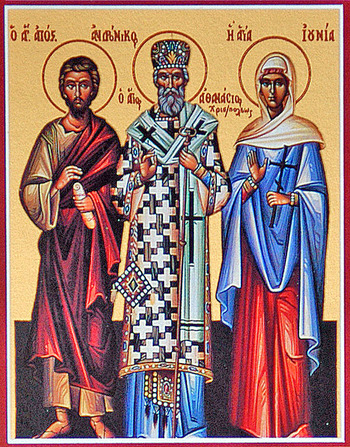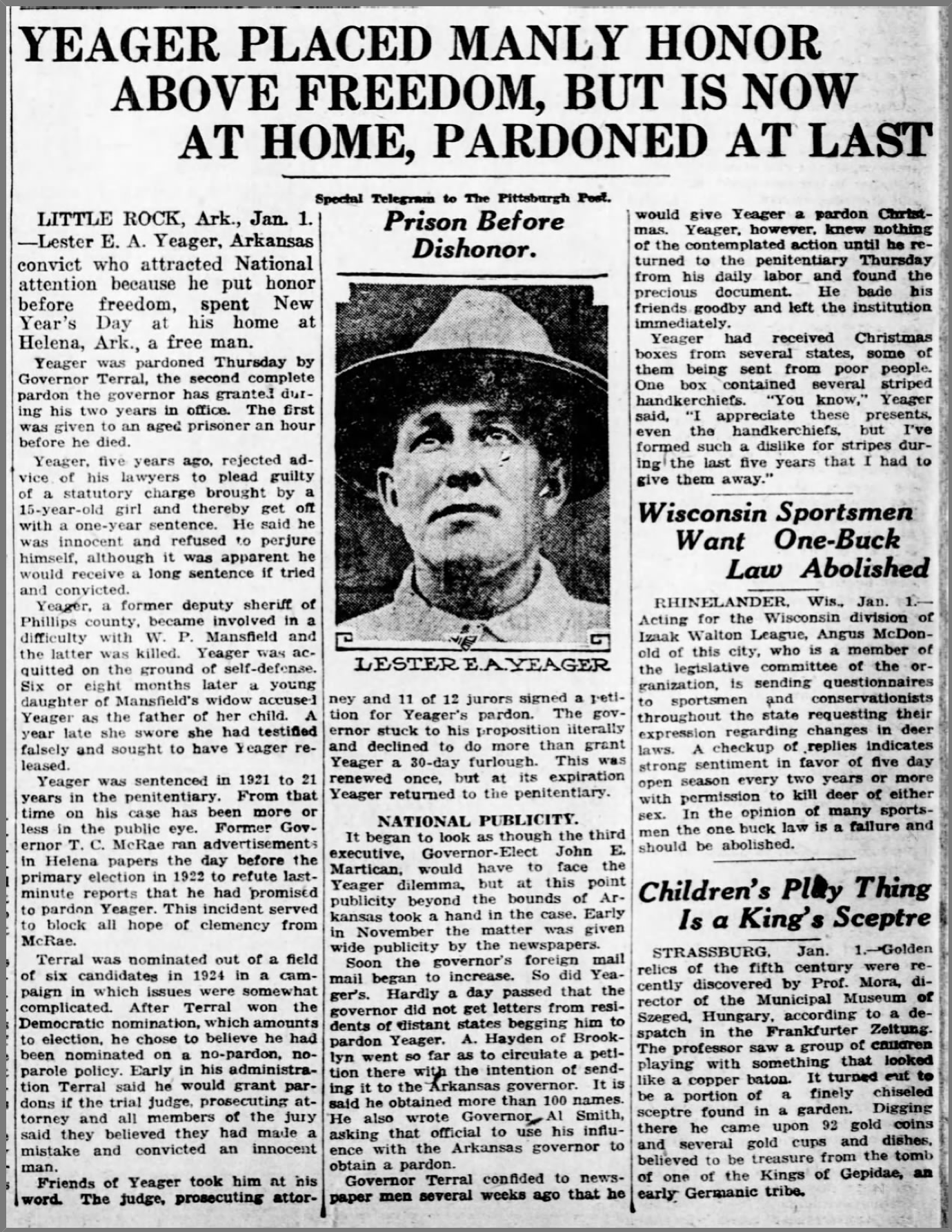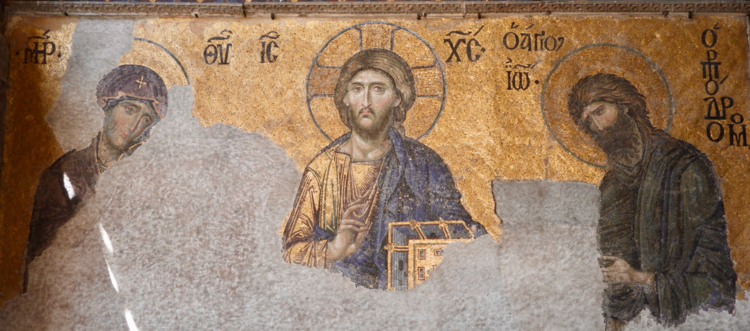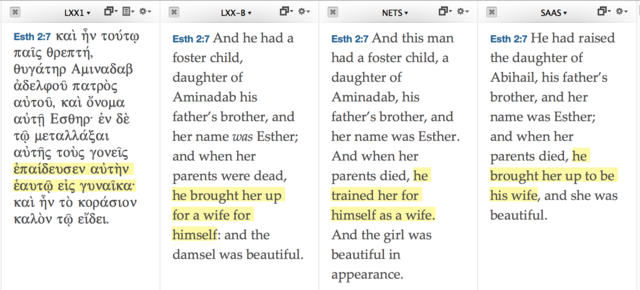 St. Andronicus on the left and St. Junia on the right.If you’ve never heard of Junia, you can’t really be faulted. She’s mentioned only once in the Bible, in Romans 16:7, among a series of greetings as the Apostle Paul closes his letter, a passage rarely heard preached in any church–
St. Andronicus on the left and St. Junia on the right.If you’ve never heard of Junia, you can’t really be faulted. She’s mentioned only once in the Bible, in Romans 16:7, among a series of greetings as the Apostle Paul closes his letter, a passage rarely heard preached in any church–
Greet Andronicus and Junia my kinfolk and fellow-prisoners, who are distinguished among the apostles and were in Christ before me. [my translation]
ἀσπάσασθε Ἀνδρόνικον καὶ Ἰουνίαν τοὺς συγγενεῖς μου καὶ συναιχμαλώτους μου, οἵτινές εἰσιν ἐπίσημοι ἐν τοῖς ἀποστόλοις, οἳ καὶ πρὸ ἐμοῦ γεγόνασιν ἐν Χριστῷ.
Moreover, if you look at this verse in certain Bible translations (RSV, ’77 & ’95 NASB, and ’84 NIV among others), you may note that you don’t even see the name Junia. Your Bible may read “Andronicus and Junias,” both of which are male names. I won’t go into the details of the debate over where a Greek accent is placed to determine if the name in question here is male or female. Suffice it to say, these days, most modern translations of the Bible correctly use the female name Junia. It’s her status as an apostle that for some readers is still a question.
Historically, the reason a lot of Bible readers have stumbled over this verse has to do with their inability to reconcile the idea that a woman could be referred to as an apostle. So, this year the Lockman Foundation released its newest (2020) revision of the New American Standard Bible. Now, overall, in what I’ve read so far, I’ve found the 2020 edition of the NASB to be an improvement over the 1977 and 1995 editions.
However, it’s very interesting that although the 2020 NASB finally gets Junia’s name and gender right, it does so at the cost of her apostleship.
| 1995 NASB |
2020 NASB |
Greet Andronicus and Junias, my kinsmen and my fellow prisoners, who are outstanding among the apostles, who also were in Christ before me.
|
Greet Andronicus and Junia, my kinsfolk and my fellow prisoners, who are outstanding in the view of the apostles, who also were in Christ before me. [emphasis added] |
For those unfamiliar with the New American Standard Bible, it finds its place among the myriads of English Bible versions as a fairly literal (formal equivalent) translation read primarily by conservative Protestant Evangelicals. Generally speaking, this is not a group whose theology would have room for a female apostle. Moreover, the NASB is known for using as few English words as possible to translate the biblical languages, often placing supposed added words in italics (an unfortunate method which often results in readers giving emphasis to these “added” words that are italicized).
Therefore, I find it ironic that the 2020 NASB uses a four-word phrase “in the view of” for one Greek word ἐν/en, a Greek preposition more properly—and formerly in the 1995 NASB—translated as among. Worse, they broke their own rules by not even using italics for all these extra added words!
The four-word phrase "in the view of" removes the possibility that Paul is calling Junia an apostle. Rather, she becomes part of a couple (with her husband Andronicus) that is highly thought of by the other apostles. Changing from the word "among" to "in the view of" is highly interpretive and evidently fits the theology of the NASB translation committee.
The answer to this issue—and how the verse should actually be translated—can be determined not by linguistics or theology but by paying attention to history. Unfortunately, history is something that much of contemporary biblical academia often ignores in this kind of debate. And ignoring the history behind the person of Junia and what it means to call her an apostle results in both error and bad translation.
Now, I first need to point out the meaning of the word apostle. In Greek, ἀπόστολος/apostolos simply means “one who is sent.” Historically (and this is the important part), the Early Church recognized two classes referred to as apostles. There is, of course, “the Twelve,” referring to the disciples who participated in Jesus’ early ministry. These and a few others, such as the Apostle Paul, also are put into this category of higher authority in the New Testament church. They went on to become church planters and bishops as Christianity spread throughout the Roman territories and beyond.
And yet, the church also recognized another category of apostle, or “one who is sent.” These would include the 70 (or 72 according to which manuscript tradition you’re reading) individuals Jesus sends out to preach the Good News in Luke 10. Think of these as the first Christian missionaries. Church tradition has kept record of who these 70 missionary apostles were, and guess what…Junia’s name—as well as that of Andronicus—is on the list. This would also explain why Paul states that Andronicus and Junia were “in Christ” (ἐν Χριστῷ) before him since he would not become a follower of Christ (see Acts 9) until at least a couple of years after Jesus’ ascension. And more than likely, when Paul referred to Andronicus and Junia as apostles, his readers knew which kind of apostles he meant.
St. John Chrysostom (AD 347-407), perhaps the greatest preacher the church has ever known, mentioned Junia in relationship to her apostleship in his sermon on Romans 16:
But to be even amongst these of note, just consider what a great encomium this is! But they were of note owing to their works, to their achievements. Oh! how great is the devotion (φιλοσοφια) of this woman, that she should be even counted worthy of the appellation of apostle! But even here he does not stop, but adds another encomium besides, and says, “Who were also in Christ before me.”
Homilies on Romans, Homily XXXI.
I find it amusing that while modern scholars want to try to fit Junia into their preconceived theologies of what an apostle is and whether or not Junia could have been one, the answer is found simply by paying attention to the understanding of the Church Fathers. This is a perfect example where the biblical text alone doesn’t provide enough context for understanding it. Certainly, if one just translated it as presented, “distinguished among the apostles,” the resulting rendering would be correct. But what Junia’s apostleship means isn’t answered by knowing Greek vocabulary and consulting lexicons. St. John Chrysostom, who lived closer to the events of the New Testament that us, surely knew his koine Greek better than any New Testament scholar alive today; but it was his grasp of history that helped him understand what it meant.
So many interpretations of the Bible—both in churches and in seminaries—don’t integrate the church’s rich history and tradition into their understanding, and this is to their loss. Before I was Orthodox, I attended a Baptist seminary. I took a wide variety of classes, including courses in church history, theology, and New Testament Greek; but no one ever talked about integrating these separate areas of study into a cohesive whole. And church history probably received the least attention.
Some Christian expressions do value history, though. We forget the past to our own peril (and bad translation). Every year, the Orthodox Church remembers “the holy, glorious, all-laudable Apostle Junia of the Seventy…on May 17 with Apostle Andronicus” (Orthodox Wiki) as they have for centuries.
 Tuesday, November 7, 2023 at 10:51PM
Tuesday, November 7, 2023 at 10:51PM  AHOS,
AHOS,  Accordance,
Accordance,  Eastern Orthodoxy,
Eastern Orthodoxy,  Kentucky,
Kentucky,  Logos,
Logos,  Louisiana,
Louisiana,  cancer,
cancer,  life in
life in  Personal
Personal 











